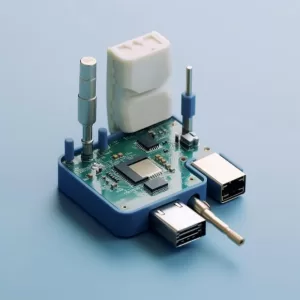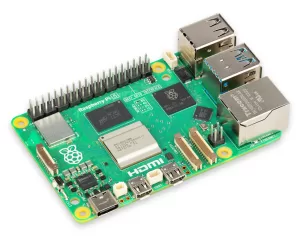
Which WiFi Adapter Works Best with a Raspberry Pi?
January 18 2024 
Inquiry
Global electronic component supplier AMPHEO PTY LTD: Rich inventory for one-stop shopping. Inquire easily, and receive fast, customized solutions and quotes.
QUICK RFQ
ADD TO RFQ LIST
In this blog, we will dive deep into the world of Raspberry Pi Wi-Fi adapters, exploring factors like compatibility, performance, features, and budget, to help you find the perfect match for your needs.
What is a WiFi Adapter?

What does a WiFi adapter do?
In essence, it transforms the wireless network's (WiFi) language into the Ethernet language of your Raspberry Pi. You can now browse the web, stream media, manage devices remotely, and do a lot more with your Pi thanks to its ability to interface with the outside world.What's a Raspberry Pi and Why Use Wi-Fi?

What Type of IOT Device is the Raspberry Pi?
The Raspberry Pi can be classified into multiple types of Internet of Things (IoT) devices depending on how you use it and its configuration. Here are some of the main categories:- Microcontroller: The Raspberry Pi falls within this broad group. It functions as a compact, programmable computer that can manage sensors and devices. It can be applied to several applications, such as data collection, task automation, and robot construction.
- Device for Edge Computing: Data can be locally processed and analyzed using the Raspberry Pi before being transferred to the cloud. Applications that require decisions to be made in real-time or have bandwidth constraints may find this helpful.
- Gateway Device: To link different IoT devices to the internet, a Raspberry Pi can serve as a gateway device. This enables you to gather information from several devices and transfer it to a central server for processing.
- Media Center: You can stream TV series, movies, and music using the Raspberry Pi as a media center. Installing different operating systems and apps, like as Plex or Kodi, can transform it into a robust entertainment center.
- Learning and Development Platform: A well-liked tool for teaching robotics, electronics, and programming is the Raspberry Pi. It has a sizable development and educational community, is inexpensive, and is simple to use.
- Smart Home Device: The Raspberry Pi can be used to create smart home devices such as light switches, security systems, and thermostats by using the appropriate software and sensors.
Video related to WiFi Adapter for Raspberry Pi
Can any Wi-Fi Adapter Work?
Yes. A Raspberry Pi can connect to most USB Wi-Fi devices. Unfortunately, driver troubles, poor performance, and compatibility concerns can soon make your project a painful experience. The Pillars of Choosing the Right Adapter:- Compatibility:
- Chipset: Seek adapters with chipsets such as Atheros AR9xxx, MediaTek MT76x2, or Realtek 8188CUS that are well-known for their strong Linux compatibility.
- Operating System: Verify that it is compatible with the Raspberry Pi OS of your choice.
- Model: The Wi-Fi capabilities of various Pi models differ. Make sure the adapter fits the version of your Pi (Pi 4B requires USB-C, for example).
- Performance:
- Speed: Take your needs into account. Perhaps a 150Mbps adaptor will do for basic browsing. Aim for 300Mbps or more while streaming and transferring large amounts of data.
- Signal Strength: If you are near Wi-Fi dead zones, pick an adapter with a powerful antenna.
- Range: Look for adapters with high-gain internal or exterior antennas if you require long-range communication.
- Features:
- Dual-band: Uses both the 2.4GHz and 5GHz bands to provide quicker speeds and fewer interference.
- WPS: Wi-Fi Protected Setup makes setup easier.
- External Antennas: Increase signal strength and offer more versatility.
- Low Power Consumption: crucial for applications using batteries.
- Budget:
- Best Overall: Edimax EW-7811Un (2.4GHz, 150Mbps, small, cheap) is the best option overall.
- Best Budget: TP-Link TL-WN725N (miniaturized, dependable, 150Mbps, 2.4GHz)
- Best Performance: Alfa AWUS036NH (dual-band, high gain, long-range antennas) has the best performance.
- Best for Portability: Panda PAU05 (miniaturized, high gain, affordable) is the best option for portability.
How to Access Raspberry Pi from Internet?
Remote Desktop/VNC:- Set up your Raspberry Pi to run a VNC server (such as TightVNC).
- To make the VNC port (usually port 5900) available from the internet, configure port forwarding on your router.
- Use a VNC client program to establish a connection to the VNC server from a distant computer by entering your router's public IP address and VNC port.
- Turn on SSH on your Rasp Pi.
- To provide internet access to the SSH port (usually port 22), configure port forwarding on your router.
- Using the public IP address of your router and the SSH port, connect to the Pi from a distant computer with an SSH client.
- Configure your Raspberry Pi using one of the cloud services offered by Amazon Web Services or Google Cloud Platform.
- This enables you to use a web browser from any location with an internet connection to access the resources on your Pi.
- Requires technical expertise to set up VPNs and other services for secure access.
- Set up your Raspberry Pi to run a web server (such as Apache or Nginx).
- To provide internet access to the web server port (usually port 80 or 443), configure port forwarding on your router.
- Using the public IP address of your router and the web server port, you may access the web server on your Raspberry Pi from a web browser.
- Some apps, like PiVPN or OpenVPN, are made expressly for Raspberry Pi remote access.
- These tools offer extra functionality like remote management and secure connectivity, while also making setup simpler.
Raspberry Pi vs Arduino
Raspberry Pi and Arduino are two popular platforms for electronics projects, but they cater to different needs:- Raspberry Pi: A multipurpose computer with networking, multimedia, and programming capabilities that runs a complete version of the Linux operating system; perfect for difficult tasks.
- Arduino: An entry-level microcontroller ideal for robotics and sensor-based applications, with an emphasis on hardware interface and straightforward programming.
Conclusion
It is easy to select the ideal Wi-Fi adapter for your Raspberry Pi if you have the correct information and direction. Always remember to give compatibility, performance, and features that meet the needs of your project priority. Discover the countless opportunities presented by this adaptable small computer and realize the full potential of your Pi!Related Articles
- ·Stratix 10 VS Stratix V: Which FPGA is Right for Your Next Project?
- ·Intel Xeon Platinum 8454H vs AMD EPYC: Which Reigns Supreme?
- ·A Deep Dive into the AMD EPYC 4564P Processor
- ·MSP430F5438A vs MSP430F5529: A Detailed Analysis of Their Capabilities
- ·Comparing MSP430F6659 and MSP430F5419A: Which One is Right for Your Project?
- ·Exploring the Features of MSP430F5529 and MSP430F5638 Microcontrollers
- ·Demystifying 20 Microcontroller Projects for Beginners
- ·Unveiling the Ultimate Guide to Microcontroller Programming
- ·4680 Battery: Unveiling the Power Potential of the Next-Gen Cell
- ·Exploring the Case Studies on Arduino Applications
Populer Posts
MC9328MX1CVM15
NXP Semiconductors
Z8S18020PSG1960
Zilog
RB80526PZ866256
Intel
MC8640DTHX1250HC
NXP Semiconductors
MPC8544VTANGA
Freescale Semiconductor, Inc. (NXP Semiconductors)
MPC8572PXATLB
NXP Semiconductors
MIMX8UX5CVLDZAC
NXP Semiconductors
P1020NSE2FFB
Freescale Semiconductor, Inc. (NXP Semiconductors)
S7100PH-HC3
MaxLinear
AM29C117GC
Advanced Micro Devices
T2080NXN8P1B
NXP Semiconductors
PPC750FX-GB1032V
IBM
